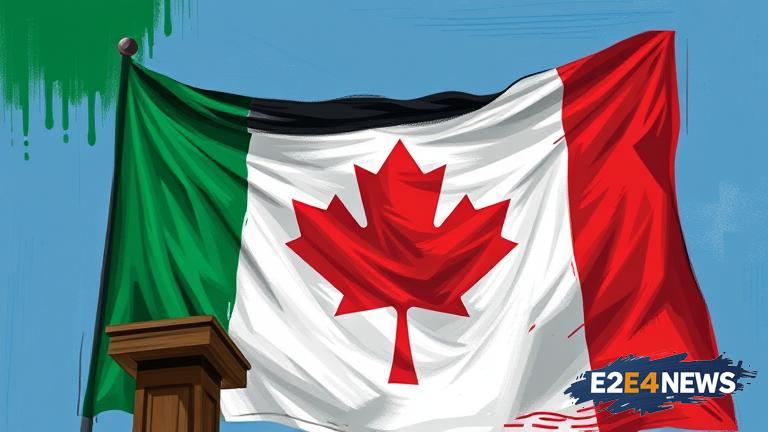In a recent announcement, Canadian Prime Minister Carney revealed that Canada will officially recognize a Palestinian state, a decision that is expected to have far-reaching implications for the country’s foreign policy and its relationships with other nations. This move is seen as a significant shift in Canada’s stance on the Israeli-Palestinian conflict, as the country has historically been a strong supporter of Israel. The decision is likely to be met with both praise and criticism, with some hailing it as a major breakthrough for Palestinian rights and others condemning it as a betrayal of Israel. The recognition of a Palestinian state is a long-standing goal of the Palestinian people, who have been seeking independence and self-governance for decades. The move is also expected to have significant implications for the Middle East peace process, which has been stalled for years. Canada’s decision is likely to put pressure on other countries to follow suit, potentially leading to a shift in the international consensus on the issue. The announcement was made by Prime Minister Carney, who stated that Canada’s decision was motivated by a desire to promote peace and stability in the region. The Prime Minister also emphasized the importance of a two-state solution, which would see the establishment of an independent Palestinian state alongside the state of Israel. The decision has been welcomed by Palestinian leaders, who see it as a major victory for their cause. However, Israeli officials have expressed strong opposition to the move, arguing that it undermines the peace process and ignores Israel’s legitimate security concerns. The recognition of a Palestinian state is also expected to have significant implications for Canada’s relationships with other countries in the region, including Israel and the United States. The decision may strain Canada’s relationships with these countries, which have historically been strong allies. However, it may also lead to improved relationships with other countries that have already recognized a Palestinian state, such as many European nations. The move is also expected to have significant implications for Canada’s domestic politics, with some critics arguing that it is a misguided attempt to curry favor with certain voting blocs. Despite the potential controversy, the decision is seen as a major breakthrough for Palestinian rights and a significant step towards a more just and equitable solution to the Israeli-Palestinian conflict. The recognition of a Palestinian state is a complex issue that involves a range of political, economic, and social factors. It is likely to be the subject of ongoing debate and discussion in the coming weeks and months. As the situation continues to evolve, it will be important to monitor developments closely and to consider the potential implications of Canada’s decision. The move is a significant development in the ongoing saga of the Israeli-Palestinian conflict, which has been a major source of tension and instability in the region for decades. The conflict has its roots in the early 20th century, when Zionist Jews began immigrating to Palestine, then under Ottoman rule. The establishment of the state of Israel in 1948 led to the displacement of hundreds of thousands of Palestinians, who were forced to flee their homes and seek refuge in neighboring countries. The conflict has continued to simmer ever since, with periodic outbreaks of violence and ongoing disputes over issues such as borders, settlements, and Jerusalem. The recognition of a Palestinian state is seen as a major step towards resolving the conflict, but it is likely to be a long and difficult process. The move is also expected to have significant implications for the global community, which has been watching the situation in the Middle East with great interest. The decision may lead to a shift in the international consensus on the issue, potentially leading to increased pressure on Israel to negotiate a peace agreement with the Palestinians. As the situation continues to evolve, it will be important to consider the potential implications of Canada’s decision and to monitor developments closely.
